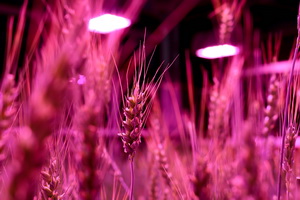
Speed Breeding and Genome Editing to Feed 10 Billion
June 20, 2019| |
 Speed breeding, together with other state-of-the art technologies such as gene editing, is the best way to develop a pipeline of new crops. This is according to an article in Nature Biotechnology authored by geneticists from the University of Queensland, Australia.
Speed breeding, together with other state-of-the art technologies such as gene editing, is the best way to develop a pipeline of new crops. This is according to an article in Nature Biotechnology authored by geneticists from the University of Queensland, Australia.
"We face a grand challenge in terms of feeding the world. If you look at the stats, we're going to have about 10 billion on the planet by 2050 and we're going to need 60 to 80 percent more food to feed everybody. It's an even greater challenge in the face of climate change and diseases that affect our crops that are also rapidly evolving," said lead author, Dr. Lee Hickey.
Traditional plant breeding, however, is a slow process. Inspired by the National Aeronautics and Space Administration (NASA)'s study on how to grow food on space stations, Dr. Hickey and team control light and temperature to send plant growth into overdrive. In their Nature article released in November 2018, they reported that they can grow up to six generations of wheat, barley, chickpeas, and canola in a year, while traditional techniques only enable 1-2 generations for that span of time.
In their latest article, Dr. Hickey reported the potential of speed breeding, as well as other techniques that may significantly contribute to food security. They have integrated new genetic techniques to optimize flowering times and make plants more resistant to the effects of climate change. For instance, they are currently working on using the CRISPR system to modify plants' genes while simultaneously speed breeding them.
One of the future plans of the team is to train plant breeders in India, Zimbabwe, and Mali in partnership with International Crops Research Institute for the Semi-Arid Tropics and support from the Bill and Melinda Gates Foundation.
Read about the benefits of speed breeding in Nature Biotechnology, Hickey Lab, The New York Times, and TEDx.
| |
Biotech Updates is a weekly newsletter of ISAAA, a not-for-profit organization. It is distributed for free to over 22,000 subscribers worldwide to inform them about the key developments in biosciences, especially in biotechnology. Your support will help us in our mission to feed the world with knowledge. You can help by donating as little as $10.
-
See more articles:
-
News from Around the World
- Speed Breeding and Genome Editing to Feed 10 Billion
- Scientists Stack Six Algorithms to Improve Predictions of Yield-boosting Crop Traits
- Genome Reveals How Almonds Went from Deadly to Delicious
- Chinese Scientists Complete Whole Genome Sequencing of Ancient Wheat Seeds
- Indian Farmers Plant Bt Brinjal as Non-violent Protest against Gov't Regulations on GM Crops
- Study Debunks Myth that Modern Wheat Heavily Relies on Pesticides and Fertilizers
- 27,000 Farmers in Bangladesh Reap the Benefits of Bt Brinjal Due to Strong Political Support
- Federal Office for the Environment Approves GM Barley Field Trial in Switzerland
-
Research Highlights
- OsbZIP62 Improves Drought and Oxidative Stress Tolerance in Rice
- Plant Virus and Insect Virus Connive for Greater Infestation
-
Beyond Crop Biotech
- 2nd Gen Friendly™ Mosquitoes Successfully Deployed
- Discovery of Bacterial Mechanisms Leads to Cytotoxicity Tolerance in Biofuels
-
Plant
- Efficient Assembly of Large Multiplex CRISPR-Cas9 Guide Arrays for Maize Genome Editing
- Researchers Develop Better CRISPR-Cas9 Using GFP Tagged Protoplasts
-
Read the latest: - Biotech Updates (January 21, 2026)
- Gene Editing Supplement (January 28, 2026)
- Gene Drive Supplement (February 22, 2023)
-
Subscribe to BU: - Share
- Tweet
